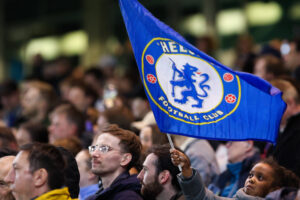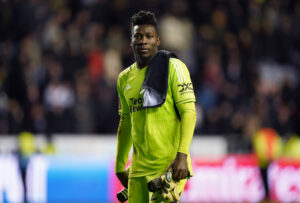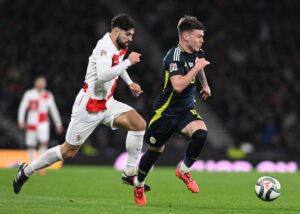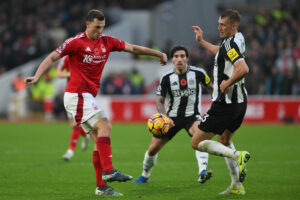This week sees the resumption of the Europa League, with José Mourinho taking his troops to Russia to face FC Rostov. Often seen as the “poor relation” to the Champions League, it is the only cup missing from Manchester United’s trophy cabinet. The main reason for this would be that, for most of the last 25 years, United have competed in UEFA’s premier competition. This season was the first time they have qualified for it through their league position since 1995.
Mourinho seems to be taking the competition more seriously than his predecessors did. He has put out a strong team in most of United’s matches this season. This might be because, with the Premier League title nearing mathematical impossibility, he sees trophies as a guarantee of calling his first year at Old Trafford a success. It could be that he sees it as a more realistic way of guaranteeing Champions League football than gambling on a top four finish. One thing seems certain, it is unlikely to be nostalgia, despite the trophy being one of the first he ever won as a manager.
Below is a brief history of United playing in the competition, under all of its various guises, as well as what it would mean to the club in terms of achievement.
The Fairs Cup
Until 1971, when UEFA took over the competition, it was known as the Inter-Cities Fairs Cup. Any victories in the competition before that year are not recognised by UEFA as part of a club’s European record. This is despite the fact that the UEFA Cup essentially replaced it.
Manchester United only played one campaign in the Fairs Cup. This was in the 1964-65 season, when they qualified having finished runners-up to league champions Liverpool. Matt Busby, known for his love of European Football took the competition very seriously indeed. United saw off Swedish side Djurgårdens in the first round. They then hammered Borussia Dortmund 10-1 on aggregate, with a particularly impressive 6-1 victory in Germany.
They were paired with Everton in the next round, winning 3-2 on aggregate before beating French side Strasbourg in the quarter-final. Their semi-final opponents were Hungarian side Ferencváros, at that time one of the best teams in Europe. United won the first leg 3-2 at Old Trafford, with their opponents winning the second leg 1-0. Because the away goals rule was not introduced until later that year, the two sides played a third match. Ferencváros won the play-off 2-1, and went on to win the trophy, beating Juventus in the final.
The UEFA Cup – the 1970’s and 80’s
When Tommy Docherty’s United achieved a third place finish in 1975-76, their first back in the top flight, they qualified for the UEFA Cup. They beat Ajax 2-1 on aggregate in the first round, before losing to Juventus in the second. The Italians went onto win the trophy that season, but there was some consolation for United. They won the F.A. Cup, their first trophy since Busby’s retirement, at the expense of bitter rivals Liverpool.
In 1980-81, United were now under the guidance of Dave Sexton. A runners-up spot the previous season guaranteed European football, but this campaign would be even more short-lived than the last. Drawn against Widzew Łódź, they went out on away goals after a 0-0 draw in Poland was followed by a 1-1 scoreline at Old Trafford. Two years later, Ron Atkinson didn’t fare any better, when his United side went out at the same stage, following a 2-1 aggregate defeat to Valencia.
In 1984-85 United made it to the quarter-finals. Along the way they beat Hungarian side Rába ETO Győr, before a narrow 1-0 aggregate win over PSV Eindhoven. The third round threw up a “Battle of Britain” against Dundee United, which turned out to be a thrilling tie. After a 2-2 draw at Old Trafford, United won the second leg 3-2 at Tannadice Park. In the quarter-final, the Red Devils were pitted against another Hungarian team, Videoton. After both teams won their respective home ties 1-0, Viedoton progressed after winning a penalty shootout. The Hungarians went on to lose the final to Real Madrid. Another opportunity to add the UEFA Cup to the Manchester United trophy cabinet had slipped through the Red Devils’ fingers.
The late 1980’s had seen English clubs banned from Europe. As a result two potential campaigns that United would have played by qualifying through their league position, in 1986-87 and 1988-89, were denied.
The 1990’s
United only played in the competition twice during this decade. Both campaigns ended in the first round, and on each occasion to Russian opposition. In 1992-93, Alex Ferguson had to contend with the UEFA “three foreigner” rule, and juggled his squad accordingly. Players such as Danny Wallace, Neil Webb and Lee Martin were fringe players by this time, but played because they were English. United were paired with Torpedo Moscow, and went out once again on penalties, following two successive 0-0 draws between the sides.
In 1995-96, the rules didn’t hinder United too much as their squad now revolved around young players such as David Beckham, Nicky Butt and Paul Scholes. Their first leg tie away to Rotor Volgograd had finished goalless, but United were expected to finish them off at Old Trafford. After the Russian side took a two goal lead, the Red Devils were left chasing the game.
At that point, United had never lost a home tie in Europe. Paul Scholes had pulled one goal back, but the most memorable moment of this game was by Peter Schmeichel. The Danish goalkeeper scored with a headed goal in the 89th minute, his only goal for the club, preserving United’s unbeaten home record. In spite of this, Volgograd went through on away goals, and United were out.
The Europa League
After a hiatus of more than 15 years, Manchester United found themselves in the knockout round of the 2011-12 competition, after failing to qualify from their Champions League group. Their first opponents were Ajax, and United won the first leg 2-0 in Amsterdam. In the second leg at Old Trafford, Ajax won 2-1 on the night but were eliminated on aggregate. Their next opponents were Spanish side Athletic Bilbao, who beat United home and away for a 5-3 aggregate scoreline. Rumour has it that this was the tie that put Ander Herrera, now a key player under Mourinho, on the Red Devils’ radar.
United once again failed to qualify from their Champions League group last season, and were pitted against Danish side Midtjylland in the round of 32. The Danes shocked United with a 2-1 home win, against all expectations. With manager Louis van Gaal facing an injury crisis, 18 year old Marcus Rashford was given his debut. He rose to the occasion, scoring twice in a 5-1 win, and is now a first team regular. The last 16 saw the first ever meeting between United and Liverpool in a European game. Liverpool won the first leg 2-0 at Anfield, and a 1-1 scoreline at Old Trafford meant that the Red Devils were out.
This season saw Manchester United compete in the Europa League group stage for the first time. They finished second in a group which included Fenerbahçe, Feyenoord and FC Zorya. They were drawn against French side Saint-Étienne in the round of 32, with a comfortable 4-0 aggregate victory setting up a tie against Russian outfit FC Rostov. Seen as an unknown quantity by many, it is worth noting that they beat Bayern Munich in this season’s Champions League. For that reason alone, Mourinho will not take this tie lightly. He has already shown by playing a strong side in the last round, which resulted in an injury to Henrikh Mkhitaryan, that this is a competition he wants to win.
The Last Word
Adding the trophy to Manchester United’s trophy cabinet would mean that the Red Devils join an elite band of clubs that have won all three European competitions. Barcelona, Ajax, Bayern Munich, Juventus and Chelsea are among those have achieved this. Clubs who never won the now-defunct European Cup Winners’ Cup, Liverpool and Real Madrid being notable examples, can never join this bracket.
Success in the competition would also mean that United would have won every major competition they have ever competed in. Obviously the Anglo-Italian Cup does not count, due to not being recognised by UEFA. It might also be Mourinho’s best opportunity, as it’s probably safe to assume that when he revealed his long-term vision for the club to Ed Woodward, success in the Europa League did not feature very highly on the agenda. It could, however, prove to be a springboard for future success.
Main Photo






